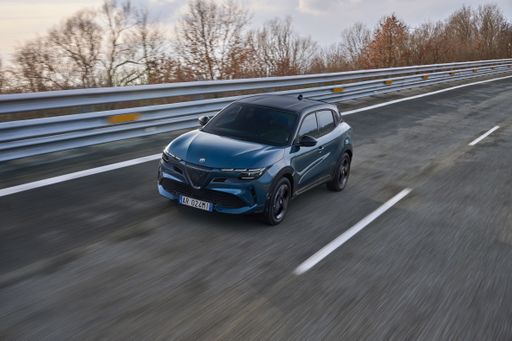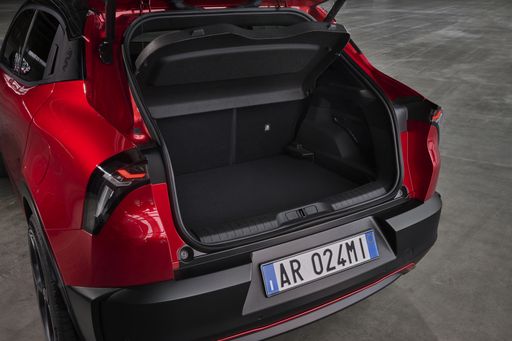Alfa Romeo Junior vs Mercedes Marco Polo – Which one offers the better deal?
Both models have their strengths – but which one suits you more?
Compare performance, efficiency, price and space directly: Alfa Romeo Junior or Mercedes Marco Polo?
Costs and Efficiency:
Price and efficiency are often the first things buyers look at. Here it becomes clear which model has the long-term edge – whether at the pump, the plug, or in purchase price.
Alfa Romeo Junior has a significantly advantage in terms of price – it starts at 25700 £, while the Mercedes Marco Polo costs 57500 £. That’s a price difference of around 31814 £.
Fuel consumption also shows a difference: Alfa Romeo Junior manages with 4.80 L and is therefore significantly more efficient than the Mercedes Marco Polo with 7.40 L. The difference is about 2.60 L per 100 km.
Engine and Performance:
Power, torque and acceleration are the classic benchmarks for car enthusiasts – and here, some clear differences start to show.
When it comes to engine power, the Alfa Romeo Junior has a slightly edge – offering 280 HP compared to 237 HP. That’s roughly 43 HP more horsepower.
In acceleration from 0 to 100 km/h, the Alfa Romeo Junior is evident quicker – completing the sprint in 5.90 s, while the Mercedes Marco Polo takes 7.40 s. That’s about 1.50 s faster.
In terms of top speed, the Mercedes Marco Polo performs minimal better – reaching 220 km/h, while the Alfa Romeo Junior tops out at 206 km/h. The difference is around 14 km/h.
There’s also a difference in torque: Mercedes Marco Polo pulls distinct stronger with 500 Nm compared to 345 Nm. That’s about 155 Nm difference.
Space and Everyday Use:
Beyond pure performance, interior space and usability matter most in daily life. This is where you see which car is more practical and versatile.
Seats: Alfa Romeo Junior offers to a small extent more seating capacity – 5 vs 4.
In curb weight, Alfa Romeo Junior is decisively lighter – 1380 kg compared to 2450 kg. The difference is around 1070 kg.
In terms of boot space, the Mercedes Marco Polo offers distinct more room – 670 L compared to 415 L. That’s a difference of about 255 L.
In maximum load capacity, the Mercedes Marco Polo performs decisively better – up to 4630 L, which is about 3350 L more than the Alfa Romeo Junior.
When it comes to payload, Mercedes Marco Polo evident takes the win – 650 kg compared to 420 kg. That’s a difference of about 230 kg.
Who wins the race?
The Alfa Romeo Junior proves to be leads convincingly overall and therefore becomes our DriveDuel Champion!
Alfa Romeo Junior is the better all-rounder in this comparison.
 @ Alfa Romeo / Stellantis Media
@ Alfa Romeo / Stellantis Media
Alfa Romeo Junior
Alfa Romeo Junior
The Alfa Romeo Junior captures the essence of Italian design with its sleek lines and compact dimensions, making it an icon of elegance and performance. With a spirited driving experience and a charming retro aesthetic, it appeals to enthusiasts and casual drivers alike. This delightful car embodies the brand's rich heritage while remaining a fun and engaging option for those seeking a unique automotive experience.
details @ Alfa Romeo / Stellantis Media
@ Alfa Romeo / Stellantis Media
 @ Alfa Romeo / Stellantis Media
@ Alfa Romeo / Stellantis Media
 @ Alfa Romeo / Stellantis Media
@ Alfa Romeo / Stellantis Media
Mercedes Marco Polo
The Mercedes-Benz Marco Polo offers a luxurious and versatile travel experience, combining high-end design with practical functionality. Its spacious interior is thoughtfully designed, providing ample comfort for long journeys, while innovative features enhance the overall driving experience. This vehicle seamlessly integrates style with adventure, making it an ideal choice for those looking to explore the open road in comfort and sophistication.
details
 @ Alfa Romeo / Stellantis Media
@ Alfa Romeo / Stellantis Media
|
|
|
|
|
Costs and Consumption |
|
|---|---|
|
Price
25700 - 41600 £
|
Price
57500 - 82600 £
|
|
Consumption L/100km
4.8 - 5.4 L
|
Consumption L/100km
7.4 - 8.3 L
|
|
Consumption kWh/100km
15.1 - 17.5 kWh
|
Consumption kWh/100km
-
|
|
Electric Range
344 - 410 km
|
Electric Range
-
|
|
Battery Capacity
0.4 - 51 kWh
|
Battery Capacity
-
|
|
co2
0 - 119 g/km
|
co2
194 - 218 g/km
|
|
Fuel tank capacity
44 - 45 L
|
Fuel tank capacity
70 L
|
Dimensions and Body |
|
|---|---|
|
Body Type
SUV
|
Body Type
Bus
|
|
Seats
5
|
Seats
4
|
|
Doors
5
|
Doors
4 - 5
|
|
Curb weight
1380 - 1689 kg
|
Curb weight
2450 - 2545 kg
|
|
Trunk capacity
340 - 415 L
|
Trunk capacity
670 L
|
|
Length
4173 mm
|
Length
5140 mm
|
|
Width
1781 mm
|
Width
1928 mm
|
|
Height
1505 - 1538 mm
|
Height
1975 mm
|
|
Max trunk capacity
1205 - 1280 L
|
Max trunk capacity
4630 L
|
|
Payload
390 - 420 kg
|
Payload
555 - 650 kg
|
Engine and Performance |
|
|---|---|
|
Engine Type
Electric, Petrol MHEV
|
Engine Type
Diesel
|
|
Transmission
Automatic
|
Transmission
Automatic
|
|
Transmission Detail
Dual-Clutch Automatic, Reduction Gearbox
|
Transmission Detail
Automatic Gearbox
|
|
Drive Type
Front-Wheel Drive, All-Wheel Drive
|
Drive Type
Rear-Wheel Drive, All-Wheel Drive
|
|
Power HP
136 - 280 HP
|
Power HP
163 - 237 HP
|
|
Acceleration 0-100km/h
5.9 - 9.1 s
|
Acceleration 0-100km/h
7.4 - 10.7 s
|
|
Max Speed
150 - 206 km/h
|
Max Speed
188 - 220 km/h
|
|
Torque
230 - 345 Nm
|
Torque
380 - 500 Nm
|
|
Number of Cylinders
3
|
Number of Cylinders
4
|
|
Power kW
100 - 207 kW
|
Power kW
120 - 174 kW
|
|
Engine capacity
1199 cm3
|
Engine capacity
1950 cm3
|
General |
|
|---|---|
|
Model Year
2024 - 2025
|
Model Year
2024 - 2025
|
|
CO2 Efficiency Class
A, C, D
|
CO2 Efficiency Class
G
|
|
Brand
Alfa Romeo
|
Brand
Mercedes-Benz
|
What drive types are available for the Alfa Romeo Junior?
Available configurations include Front-Wheel Drive or All-Wheel Drive.
The prices and data displayed are estimates based on German list prices and may vary by country. This information is not legally binding.
